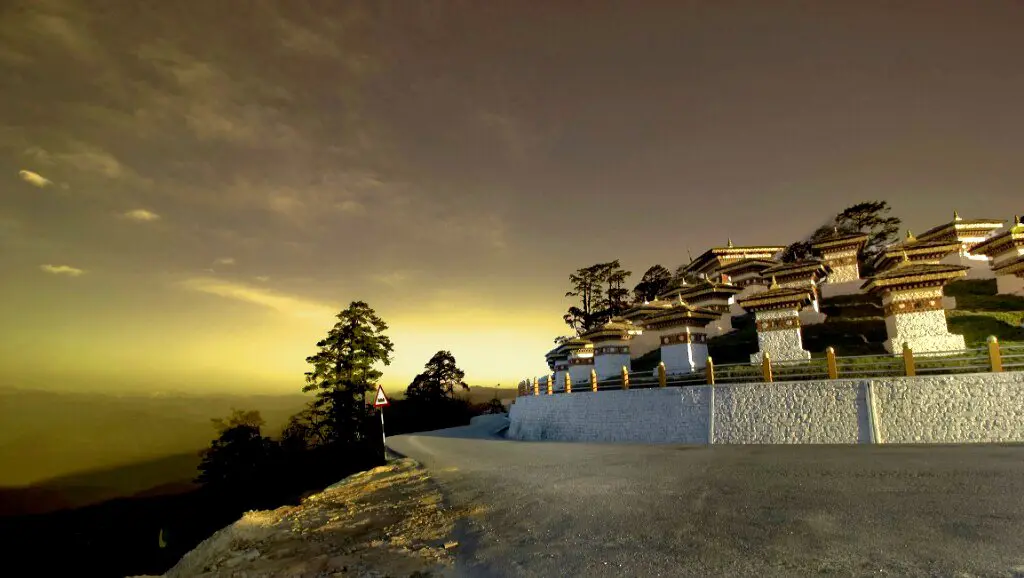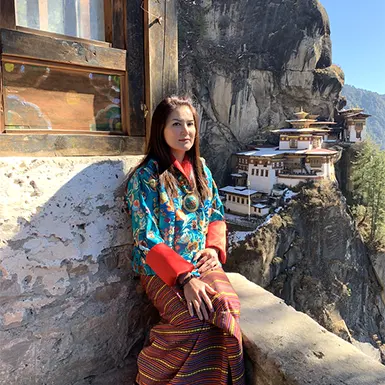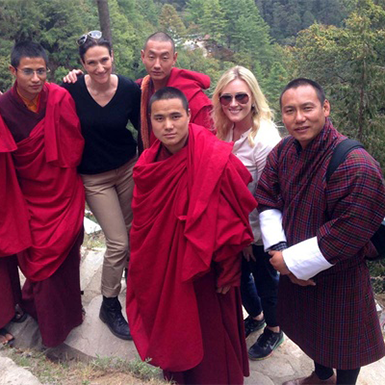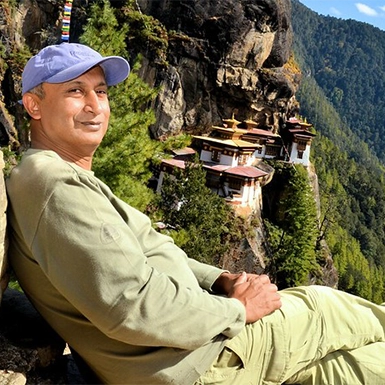Based on 4 reviews

Bhutan Cultural Tour
Bhutan in a Week: Unforgettable Sights & Spiritual Journey
Duration
Meals
- 6 Lunch
- 6 Dinner
- 6 Breakfast
Accommodation
Paro – Mandala Resort
Thimphu – Hotel Pedling
Punakha – Hotel Vera
Activities
- Sightseeing
- Trekking
- Scenic Drive/Flight
SAVE
€ 470Price Starts From
€ 2350
Overview of Bhutan Cultural Tour
Embracing the world gradually after centuries of chosen solitude, Bhutan unveils itself as an exceptional destination for a Bhutan cultural tour, nestled within the embrace of the Eastern Himalayas. This enigmatic kingdom, with a population akin to that of Switzerland and occupying a similar geographical footprint, forges a unique identity rooted in its people’s profound religious and cultural practices.
As the globe’s sole dominion where Mahayana Buddhism predominates, Bhutan’s allegiance to the tenets of Buddhism cultivates a harmonious coexistence between its unspoiled natural beauty, rich biodiversity, and the Bhutanese way of life.
Trip Highlights
- Trek to Paro Taktsang (Tiger’s Nest Monastery)—Start a journey to this revered cliffside monastery, which is marveled at for its spiritual significance and architectural wonder.
- Explore Punakha Dzong – Marvel at the grandeur of this fortress, where two rivers meet, displaying the finest Bhutanese architectural artistry.
- Discover Thimphu’s Cultural Landmarks—Explore the capital’s highlights, including the serene National Memorial Chorten and the majestic Great Buddha Dordenma.
- Admire the Views from Dochula Pass – Experience the Himalayan vistas from this picturesque pass, graced with 108 chortens, offering a panorama of the mountain range.
- Visit Thimphu’s Textile and Folk Heritage Museums. These insightful museums allow visitors to Dive into the depths of Bhutanese culture, arts, and craftsmanship.
- Uncover the Beauty of Paro Rinpung Dzong—Step into the “Fortress on a Heap of Jewels,” which showcases Bhutanese monastic life and governance traditions.
- Enjoy a Traditional Bhutanese Farmhouse Experience—Visit a local farmhouse to get a taste of genuine Bhutanese hospitality and lifestyle.
Despite limited engagement with the outside world, Bhutan has preserved its sovereignty and rich cultural heritage. The arrival of Guru Rinpoche in the 8th century and the transformative era initiated by Zhabdrung Ngawang Namgyal in the 17th century are pivotal moments in Bhutan’s history.
These figures, along with the crowning of Gongsar Ugyen Wangchuck as the first king in 1907 and the transition to a constitutional monarchy in 2006, have shaped Bhutan’s governance and cultural identity. Cultural tour packages often highlight these significant historical and cultural epochs, inviting travelers to immerse themselves in the kingdom’s spiritual legacy and mystical allure.
The crowning of Gongsar Ugyen Wangchuck as the first king in 1907 marked a significant moment in Bhutan’s governance, reflecting the unity and determination of its people. The transition towards modern governance reached a historic milestone in 2006 when Jigme Singye Wangchuck, the fourth king, led the shift to a constitutional monarchy and parliamentary democracy.
This transition culminated in the kingdom’s first democratic elections in 2008, coinciding with the centennial celebration of the monarchy and the crowning of Jigme Khesar Namgyel Wangchuck, the fifth king. This vibrant period, marked by cultural festivities and the natural splendor of Bhutan’s landscapes, offers visitors a unique opportunity to engage deeply with the kingdom’s rich traditions and majestic scenery.
Detail Itinerary of Bhutan Cultural Tour
Day 01: Arrival in Paro (2,280m) and Scenic Transfer to Thimphu (2,334m) - 55 km / 1.5 Hours Drive
As you start your Bhutan Cultural Tour, the Himalayas unfold before you in a magnificent display as the flight from Kathmandu traces these mountains, offering stunning vistas and an exhilarating entrance into the kingdom.
After completing the immigration formalities and collecting your luggage, our representative will meet you and begin the drive to Thimphu, the capital of Bhutan. This journey stops at Chuzom, where the Thimphu and Paro rivers picturesquely converge, featuring stupas adorned in Tibetan, Nepalese, and Bhutanese architectural styles.

Near Chuzom, you are greeted by the sight of Tachogang Lhakhang, or “the temple of the excellent horse,” on your left. In honor of Balaha, the excellent horse, people founded this temple dedicated to Chenrezig, the Buddha of compassion, in the 15th century.
Upon arrival in Thimphu, you will check into your hotel. Thimphu, as the center of Bhutan’s government, religion, and commerce, blends modern development with ancient traditions in a unique landscape that remarkably operates without traffic lights.
In the evening, you will stroll through Thimphu’s Main Street and market area to immerse yourself in local culture. The Local Crafts Bazaar, offering a glimpse into Bhutan’s exquisite traditional arts, awaits your exploration. Here, you can find handwoven fabrics, Thangkha paintings, masks, porcelain, slate and wood carvings, jewelry, and other goods made from local materials, perfect for taking a piece of Bhutan home with you.

Your day concludes with an overnight stay at a hotel in Thimphu, situated at an altitude of 2400 meters, marking the beginning of your memorable journey through Bhutan.
Accommodation: Hotel Pedling or a similar 3-star hotel
Meals: Lunch and Dinner
Day 02: Discovering the Heart of Thimphu (2,334m) - Full Day Exploration
Begin the day with breakfast and then dive into Thimphu Valley’s sightseeing adventure. Let us begin with the National Library, which has an invaluable collection of manuscripts related to Buddhism. The Institute for Zorig Chusum, better known as the Painting School, is the next place you visit.

Here, students spend six years studying all 13 of Bhutan’s traditional arts and crafts in-depth. Next, visit the Textile Museum for an in-depth look at one of Bhutan’s distinctive art forms. Also, take a tour of Simply Bhutan, a lively living museum and studio celebrating Bhutanese cultural heritage.

Post-lunch, take a short 15 km drive to Pangri Zampa, a 16th-century monastery situated just north of Thimphu and among Bhutan’s oldest. This monastery operates as a monastic school where monks study Lamaism and astrology, deeply rooted in Buddhist philosophy.

Continue to Buddha Point (Kuensel Phodrang), located just a short drive from the heart of Thimphu, where you can enjoy panoramic views of the Thimphu Valley. Here, visitors have the opportunity to offer prayers to the country’s largest Buddha statue and admire the valley’s scenic views.

Next, visit King’s Memorial Chorten, a monument continuously surrounded by devotees offering prayers and spinning prayer wheels. King Jigme Dorji Wangchuk, the third monarch of Bhutan and often hailed as “the father of modern Bhutan,” initiated the construction of this monument as a symbol of global peace and prosperity. Today, it serves as a tribute to the late King and a beacon of peace.

Conclude your day with a visit to Trashichhoe Dzong, an impressive combination of a fortress and monastery. This site houses the Secretariat, the throne room of His Majesty the King, along with various government offices, and acts as the summer residence for the Chief Abbot and the central monastic body.
Wrap up the day by settling into a Thimphu hotel for the night.
Accommodation: Hotel Pedling or a similar 3-star hotel
Meals: Lunch and Dinner
Day 03: Journey from Thimphu (2,334m) to Punakha (1,200m) - 75 km / 3 Hours Drive
Enjoy breakfast at the hotel before departing for Punakha on your Bhutan Cultural Tour, crossing the Dochula Pass (3080m) adorned with Bhutanese Chortens and fluttering prayer flags. This high pass offers breathtaking views of the eastern Himalayas on a clear day, providing a memorable transition between destinations.

Upon arrival and check-in at your hotel in Punakha, visit the grand Punakha Dzong, an architectural marvel at the confluence of two rivers. Serving as Bhutan’s capital until 1955, this dzong is a winter home for monk bodies, highlighting its enduring significance in Bhutanese culture.

Next, start an excursion to Chimi Lhakhang, starting with a 15-minute drive from the hotel to the beginning of a trek. This approximately 1.5-hour round trip through paddy fields and villages leads to the renowned “temple of fertility” perched on a valley hillock. Known to bless childless couples with children shortly after their visit, the path through Pana village offers an authentic look into the villagers’ daily lives.

Spend your evening exploring the enchanting Punakha village along the riverbank, absorbing the serene atmosphere and picturesque views.
Conclude your day with an overnight stay at a hotel in Punakha, adding another chapter to your 6-night, 7-day Bhutan Tour adventure.
Accommodation: Hotel Vara or a similar 3-star hotel
Meals: Breakfast, Lunch and Dinner
Day 04: Exploring Punakha's Heritage and Nature (1,200m) - Discoveries Around the Valley
Start with breakfast and hike along the Mo Chhu banks through fields of chilies, cabbages, and rice to reach Khamsum Yuelley Namgyal Chorten, a stunning monument consecrated in 1999 by the Queens.

Next, visit the Nunnery of Sangchhen Dorji Lhuendrup Lhakhang. This majestic structure is perched atop a ridge and is surrounded by pine trees. It offers views of the Punakha and Wangdue Phodrang valleys.
The temple features a 14-foot bronze statue of Avalokiteshvara (Chenrigzig chatting chanting), along with other notable figures. Local Bhutanese artisans crafted this one of the country’s largest statues.

The complex also includes a higher learning and meditation center for nuns, where they receive religious training and life skills in tailoring and thangka painting.
Spend the night at a hotel in Punakha.
Accommodation: Hotel Vara or a similar 3-star hotel
Meals: Breakfast, Lunch and Dinner
Day 05: Majestic Return Journey to Paro (2,280m) - 120 km / 4.5 Hours Drive Approx
After breakfast, check out of the hotel and drive to Paro to explore Simtokha Dzong. This fortress, founded in 1627, functions today as a School for Buddhist studies.

After arriving in Paro and checking into your hotel, have lunch and then visit Ta Dzong. Originally a watchtower, it now serves as the National Museum, displaying a rich collection of antique Thangkha paintings, textiles, and more.

Then, take a short walk to Rinpung Dzong (Paro Dzong), known as “the fortress of the heap of jewels” and famous for its elaborate wall paintings depicting Buddhist lore.
Stay overnight at a hotel in Paro.
Accommodation: Mandala Resort or a similar 3-star Resort
Meals: Breakfast, Lunch and Dinner
Day 06: The Spiritual Climb to Paro Taktsang (Tiger's Nest Monastery) - A Day of Hiking
After breakfast, set off on a trek to Taktsang Monastery, also known as Tiger’s Nest. This iconic monastery sits on a cliff 900 meters above the Paro Valley floor and is celebrated for being Guru Rinpoche’s meditation site. This sacred site, visited by all Bhutanese at least once, was restored after a fire in 1998.
In the afternoon, explore the ruins of Drukgyel Dzong, where Bhutanese warriors defended against Tibetan invaders, with views of Chomolhari.
In the evening, visitors can explore Kyichu Lhakhang, founded by Tibetan King Songtsen Gampo in the 7th century and considered the birthplace of Buddhism in Bhutan.
Spend the night at a hotel in Paro to round off.
Accommodation: Mandala Resort or a similar 3-star Resort
Meals: Breakfast, Lunch and Dinner
Day 07: Farewell Bhutan - Departure from Paro International Airport (2,280m)
Have an early breakfast at the hotel and then drive to the airport for your onward flight. Our representative will ensure a smooth departure process and warmly see you off.
Meals: Breakfast
Customize this trip with help from our local travel specialist that matches your interests.
Includes & Excludes
What is included?
- Accommodation: Enjoy comfortable stays throughout your journey with hotels included as per the tour itinerary.
- Sightseeing: All entrance fees to cultural sites and attractions visited during the Bhutan Cultural Tour are covered.
- Private Transportation: Relax and avoid any travel hassles with private transportation throughout the tour.
- Expert Guidance: Gain insightful cultural experiences with an English-speaking local tour guide by your side.
- Bhutan Visa & Permits: Eliminate visa worries – your Bhutan visa fee and all necessary tour sightseeing permits are included.
- Taxes: All applicable taxes are covered for a stress-free travel experience.
What is excluded?
- International Airfare: The cost of your international flight to Bhutan is not included in the tour price. We recommend searching for flights online or consulting a travel agent for the best deals.
- Personal Expenses: Expenses of a personal nature, such as bar bills, laundry services, phone calls, internet charges, souvenirs, and snacks, are not included. We recommend budgeting an additional amount for these based on your spending habits.
- Travel Insurance: Travel insurance is not included in the tour price. We highly recommend purchasing travel insurance to protect yourself in case of unexpected circumstances like trip cancellation, medical emergencies, or lost luggage.
- Tipping: Tipping for your guide and driver is at your discretion. However, if you’d like to show your appreciation for their service, a gratuity is always welcome. We can provide you with recommended tipping guidelines upon request.
Departure Dates
We also operate Private Trips.
Good To Know
- Land area: 38,394 square kilometers
- Forest area: 72.5 %
- Altitude: between 240metres and 7541metres above sea level
- Inhabitants: 700,000
- Language: official language “Dzongkha,” English widely spoken
- Religion: Vajrayana stream of Mahayana Buddhism (Also known as Tantric Buddhism)
- Currency: Ngultrum (equal to Indian Rupee)
- Capital: Thimphu
- National Tree: Cypress
- National Bird: Raven
- National Flower: Blue Poppy
- National Sport: Archery
- National Animal: Takin
- Local time: Six hours ahead of GMT and half an hour ahead of Indian Standard Time
Trip Information
Best Time for a 7-day Bhutan Cultural Tour
Spring (The Season of Festivals): From March to May, spring ushers in the optimal period for the Bhutan Cultural Tour, appealing particularly to those eager to dive into Bhutan’s lively festivals. The scenery explodes with vibrant floral colors, with the famous rhododendrons enhancing the visual appeal of treks to iconic sites like Paro Taktsang. The Paro Tshechu, a major and vivid festival, draws locals and visitors alike to experience the spectacle of giant thangkas and entrancing mask dances that bring Buddhist stories to life.
Autumn (Clear Skies and Cultural Richness): The months from September to November define autumn as a prime time for a 7-day Bhutan Cultural Tour. Clear, blue skies dominate, offering unparalleled views of the Himalayas, enriching visits to Dochula Pass, and treks to Tiger’s Nest Monastery. This season also thrives culturally, highlighted by the Thimphu Tshechu, transforming the capital into a vibrant stage for traditional dances, music, and festivities that offer a window into Bhutanese culture.
Winter (Serenity and Snow-capped Peaks): Though winter, spanning December to February, may deter some with its cooler climate, it uniquely enriches a Bhutan Cultural Tour. The crisp air and prominently visible snow-capped Himalayas, especially from sights like Punakha Dzong and Paro, introduce a period of peace and minimal tourist activity, allowing for a closer connection with Bhutan’s monastic life, dzongs, and museums. Winter festivities, such as the Punakha Dromche and Losar (Bhutanese New Year), highlight the enduring traditions and celebratory spirit of the Bhutanese.
Travel Insurance
We strongly recommend that you secure travel insurance to maintain peace of mind throughout your journey in Bhutan. A comprehensive travel insurance policy will cover you against unforeseen circumstances, such as medical emergencies, trip cancellations, lost luggage, and other potential travel disruptions.
Bhutan’s diverse terrain and adventurous activities, like the trek to the Tiger’s Nest Monastery, make insurance coverage crucial. This coverage ensures you can immerse yourself fully in Bhutan’s rich cultural and scenic offerings, confident that you have support in the event of any unexpected situations.
Permits and Regulations
Joining the Bhutan Cultural Tour means you must follow specific permits and regulations that protect the country’s natural and cultural treasures. Every traveler needs to secure a visa and specific area permits, especially for visits to landmarks like the iconic Tiger’s Nest Monastery. Bhutan’s tourism strategy, emphasizing sustainability and cultural and environmental respect, includes a daily tariff to control visitor numbers.
This approach guarantees that all tours, cultural explorations included, offer positive contributions to the local economy and aid in environmental preservation. We encourage travelers to honor local customs and traditions, wear suitable attire at religious sites, and adhere to environmental practices to reduce their impact, ensuring a travel experience that is both responsible and deeply rewarding.
Health and Safety Precautions
For a seamless 7-day Bhutan Cultural Tour, focusing on health and safety ensures a memorable journey. Travelers must update their routine vaccinations and consider getting recommended vaccines for Bhutan, like Hepatitis A and Typhoid, especially if they plan to enjoy local street food. Acclimatizing to the varying altitudes of Bhutan is vital to avoid altitude sickness, so visitors should drink plenty of water and increase elevation slowly. It’s wise to carry a basic first-aid kit and any personal medications needed.
Bhutan’s high cleanliness and public health standards typically make it a safe travel destination. However, actively keeping up with local health advisories and following road safety rules during mountainous drives will further secure your safety. By taking these steps, travelers can fully engage with the cultural wonders and natural splendor of Bhutan, free from health worries.
Guide Services
Guide services significantly enhance the travel experience, particularly on culturally rich tours like those in Bhutan. Knowledgeable guides not only handle the journey’s logistics but also immerse travelers in the historical, cultural, and spiritual essence of the destination. By offering insightful narratives on landmarks, traditions, and the everyday lives of locals, they bridge the cultural divide between visitors and the community.
Guides also play a crucial role in ensuring travelers adhere to local customs and environmental practices, thereby enriching the travel experience and fostering responsible tourism. Engaging a local guide supports the economy and allows for a deeper, more authentic discovery of Bhutan’s vast heritage and stunning scenery.
Communication and Connectivity
On the Bhutan Cultural Tour, effective communication and connectivity significantly enrich the journey. Bhutan provides dependable mobile network coverage across its major towns and cities, with several operators catering specifically to the needs of international tourists. At entry points or within major urban areas, tourists have the option to buy local SIM cards, with only a valid passport required for registration. Although coverage in remote regions might need to be more consistent, key tourist areas generally maintain connectivity.
Furthermore, Wi-Fi is widely available in hotels and guesthouses in both urban centers and popular tourist locations, enabling visitors to connect to the internet and communicate with loved ones easily. This fusion of Bhutan’s traditional allure and contemporary communication facilities allows visitors to effortlessly share their experiences in Bhutan, blending cultural exploration with the ability to stay connected to the wider world.
Related Article:
Frequently Asked Questions
Imagine yourself exploring Bhutan in spring (March to May) or autumn (September to November). These shoulder seasons are fantastic for cultural tours because the weather is delightful. With mild temperatures and clear skies, you can comfortably enjoy outdoor activities and experience Bhutan’s lively festivals.
Spring is a visual feast in Bhutan. The valleys explode with colorful blooms, creating a breathtaking landscape. Autumn boasts a vibrant calendar of cultural celebrations, including the famous Thimphu Tshechu festival. If you’re looking to immerse yourself in Bhutanese traditions and customs during your Bhutan Cultural Tour, autumn is the perfect time to go!
Except for citizens from India, Bangladesh, and the Maldives, every international visitor needs to secure a visa for Bhutan. Registered Bhutanese tour operators Like Peregrine Treks and Tours take charge of the visa application process, ensuring approval before the traveler’s arrival. This requirement mandates that visitors arrange their entire trip through these operators, facilitating a well-organized visit and supporting Bhutan’s sustainable tourism initiatives.
Bhutan’s government mandates a daily tariff for all tourists, encapsulating a comprehensive package that covers accommodation, meals, private transport, guide services, and a sustainable tourism royalty. This approach to tourism management aims to sustainably contribute to the conservation of Bhutan’s natural and cultural assets while assuring visitors of a quality experience.
Visitors touring Bhutan should dress modestly, particularly at religious sites like temples and monasteries, covering shoulders and knees as a sign of respect. Comfortable and weather-appropriate clothing is advisable for outdoor activities and treks, respecting Bhutanese cultural norms and ensuring a comfortable exploration.
The Bhutanese Ngultrum (BTN), equivalent to the Indian Rupee, serves as Bhutan’s local currency. Although larger hotels and urban areas are increasingly accepting credit cards, carrying cash is recommended for transactions in smaller towns, local markets, and remote areas, ensuring readiness for places where digital payments aren’t feasible.
With its low crime rate and hospitable people, Bhutan stands out as a safe destination for solo travelers. However, awareness of local customs and health advisories remains crucial for a secure and smooth travel experience across the kingdom.
Purchasing a local SIM card upon arrival presents a cost-effective solution for international visitors to make calls and access data services in Bhutan, necessitating an unlocked phone. SIM cards are widely available, guaranteeing connectivity throughout their stay in Bhutan.
Bhutan offers basic medical facilities in its major towns, with a higher level of care available at the national referral hospital in Thimphu. Travelers with specific health needs should carry an adequate supply of medications, as limited availability might restrict access. The country’s healthcare is accessible, but the remoteness of some locations may restrict immediate medical services, highlighting the importance of preparedness and securing travel insurance.
Reviews on Bhutan Cultural Tour
A Journey Through Time in the Land of the Thunder Dragon
Bhutan Cultural Tour was an experience beyond compare! Stepping into this Himalayan kingdom felt like entering a mystical land untouched by time. Our guides, incredibly knowledgeable and friendly, led us through ancient monasteries perched on mountaintops, their colorful prayer flags fluttering in the crisp air. We witnessed elaborate mask dances performed by monks, the vibrant costumes and rhythmic chanting transporting us to another era. The highlight was a homestay with a local family, where we learned traditional Bhutanese cooking and archery, forging a genuine connection with their warm hospitality. Bhutan’s breathtaking scenery and its deeply spiritual culture left an indelible mark on my soul.

Lee H. McCann
41 Calico Drive Spokane, WA 99201Unveiling the Hidden Gem - A Cultural Tour in Bhutan
Bhutan’s Cultural Tour exceeded all my expectations! Forget crowded tourist destinations; this trip was an intimate exploration of a unique culture. We hiked through stunning valleys dotted with serene dzongs (fortress-monasteries), their imposing architecture a testament to Bhutan’s rich history. We delved into the fascinating world of Buddhism, attended prayer ceremonies, and learned about its profound impact on Bhutanese life. Peregrine Tour ensured a comfortable yet authentic experience, with stays in charming boutique hotels and delicious local meals. This wasn’t just a vacation; it was a transformative journey that opened my eyes to a different way of life, one focused on happiness and respect for nature.

Francisco P. Hill
2470 Fire Access Road High Point, NC 27260A Cultural Feast for the Senses - Bhutan Unveiled
Bhutan’s Cultural Tour was a sensory overload in the best way possible! The vibrant prayer flags decorating every mountain pass, the melodic chanting of monks echoing through valleys, and the breathtaking beauty of the Himalayas created an unforgettable atmosphere. We visited bustling local markets, where we haggled for handcrafted souvenirs and indulged in steaming bowls of momos (dumplings). The highlight was attending the Tsechu festival, a kaleidoscope of color with masked dances and traditional music. Our guide, a passionate storyteller, brought Bhutan’s history and traditions to life. Overall, this Bhutan Cultural Tour was a perfect blend of cultural immersion, breathtaking scenery, and delicious food, leaving me yearning to return to this magical kingdom.

Justin B. Johnson
1691 Blane Street Saint Louis, MO 63101

